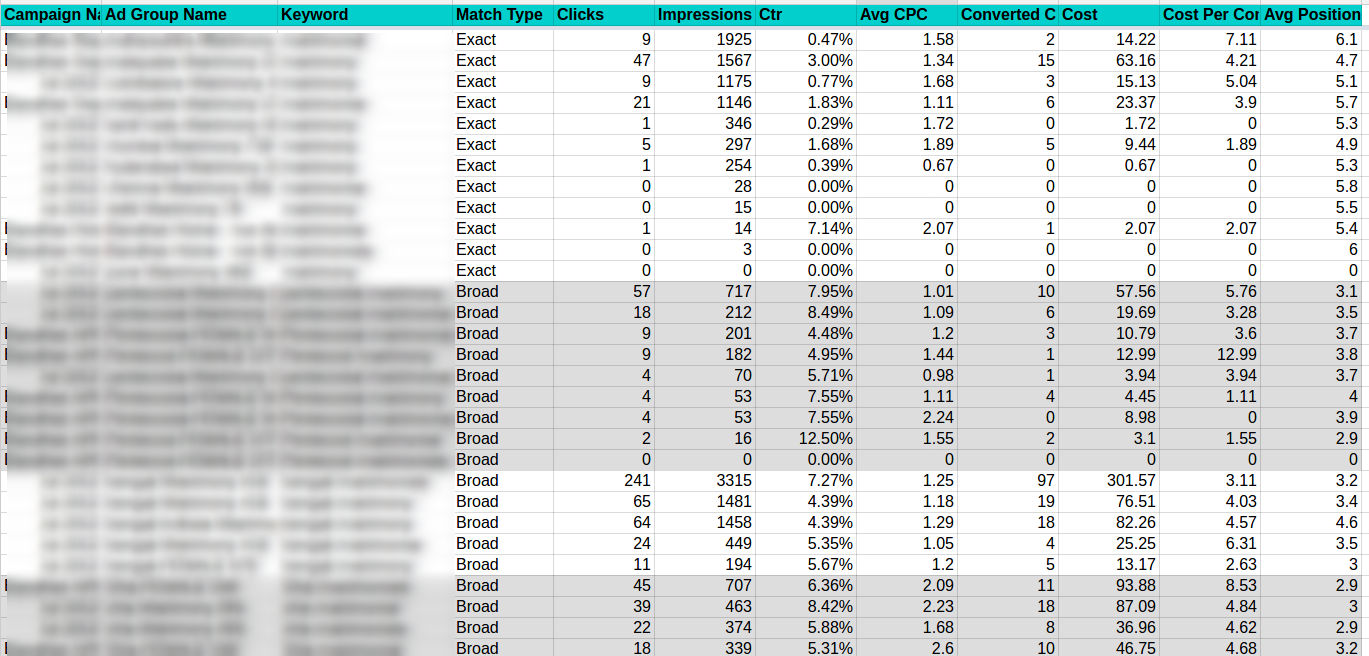PPC campaigns use a mix of keyword match types to leave no opportunity in tapping the right search query. But is it resulting in triggering the right ad at the right cost and delivering results.

What is Keyword Cannibalization?
When your keywords compete against each other for a search query that they get matched with, is what is called Keyword Cannibalization. In such a case, Google tends to show the ad it deems relevant. The relevancy of an ad is dependent on what is called the ad rank which is again decided by the quality score and CPC bid that is assigned to the keyword.
So here is how the search terms are mapped to the following keywords

In the above cases where the search query gets matched to more than one keyword match type and hence there is a possibility of the ad getting served for either of these keywords. This breaks the continuity of the flow of traffic for that search term as you have no control over the behavior of that keyword. You may notice that it will get get matched to one keyword at one week and the other keyword the following week.
This traffic swing happening from one keyword to the other, results in spike in traffic unwittingly and also unclear reason as to what lead to it. Cannibalization is a common hindrance and a much avoidable one. The ramifications of cannibalization are:
- Results in higher costs
- You end up serving poor ad
- Low conversions
Now, lets learn how we can resolve the issue of cannibalization.
Solution to avoid keyword cannibalization
1. It is best to review the search terms report to find which keywords are triggering the ad. Keeping a close watch on the keyword and search terms relation can help take necessary action..
2. If you have grouped your ad groups basis match types then pick up your exact match keywords, that are more likely to have a higher quality score and conversion rate, and add them as negative keywords for your phrase match type campaigns or ad groups. Similarly, make sure that traffic for phrase match type is not served by broad match type.
3. Review the assigned keyword match type. If you find that your exact match type keyword is getting you the clicks and impressions then you can remove that keyword added under the other match type. This removes duplicate content and your keyword and ad relevancy will be more appropriate.
4. If there is a budget constraint, avoid adding more keywords to your ad group. Hence avoid the risk of cannibalization, increasing costs and depleting budget. It will be more appropriate to follow the SKAG approach to make your ad more relevant to the search term.
5. Google matches even the close variants of the keyword. Adding the plurals, misspellings separately as keywords will result in cannibalization. To identify the duplicate keywords or close variants, you can use our free AdWords Script.

6. For a DSA campaign, the keyword again might be mapped with it as well as another campaign from your account. It is ideal to block those keywords from your DSA campaign for which an existing campaign is bidding.
With all these solutions you can be rest assured that the problem of keyword cannibalization is resolved and the right ad is delivered to your audience.
Related Links:






Annna
How can I ” make sure that phrase match type is not served by broad match type”? If you use both phrase match and BMM match in same ad group?
Shashikant
It is advisable that you use separate ad groups for each match type. Or, you could have campaign by match type. (I’m sure there different schools of thoughts on this, but, campaigns by match type has served us well.) This may get tedious to set up. But, the effort pays you off over a period of time.